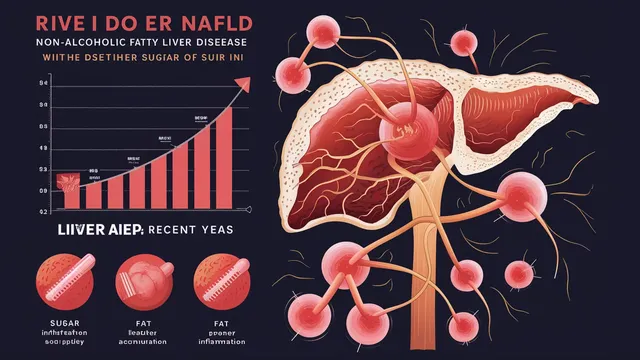Millions of people worldwide are afflicted with non-alcoholic fatty liver disease, which is on the rise. Although lifestyle choices and genetics play a part, sugar seems to be a major cause of this illness. This is the true nature of the relationship between sugar and NAFLD.

Individuals with NAFLD have an excessive build-up of fat in their livers and typically consume little to no alcohol. It can range from non-alcoholic steatohepatitis (NASH), which can cause serious liver damage such as cirrhosis and liver cancer, to simple fatty liver (steatosis). Diet is a major factor, as evidenced by the rise in cases of NAFLD that correlates with increases in obesity and metabolic syndrome.
What function does sugar serve in the diet?
Sugar is a common ingredient in processed foods and sugar-filled beverages, especially fructose. Fructose is mainly metabolized in the liver, as opposed to glucose, which is processed by a number of bodily tissues. Understanding how sugar affects liver health requires an understanding of this difference in metabolism.
The liver's metabolism of fructose
Fructose is transferred to the liver upon consumption, whereupon it can undergo a process known as de novo lipogenesis to be transformed into fat. This process adds to the hepatic fat buildup that is a characteristic of nonalcoholic fatty liver disease. Diets high in fructose have the potential to exacerbate liver damage by causing insulin resistance and inflammation in the liver.
Numerous research have looked into the connection between sugar consumption and non-alcoholic fatty liver disease. According to a significant study that was published in the Journal of Hepatology, fructose consumption was significantly higher in NAFLD patients than in non-patients. The study made clear that eating too much fructose was linked to higher levels of inflammation and liver fat.
Reducing sugar consumption, especially fructose, has been shown in another study published in the American Journal of Clinical Nutrition to significantly lower liver fat and enhance liver function. In individuals who cut back on sugar, markers of liver inflammation decreased and insulin sensitivity improved.
What effects do sugar-filled drinks have?
Fruit juices and sodas are two common sugary drink sources that contain fructose. Frequent use of these beverages has been connected to the onset and development of NAFLD. According to a study that was published in the Journal of Gastroenterology, people who drank more sugary drinks than others had a higher prevalence of non-alcoholic fatty liver disease (NAFLD).
What mechanisms underlie liver damage caused by sugar?
In order to comprehend how sugar damages the liver, it is necessary to examine several mechanisms:
• Increased fat production: As was previously mentioned, the liver converts fructose to fat, which causes fat to build up.
• Oxidative stress: Reactive oxygen species (ROS), which are produced during the metabolism of fructose, lead to oxidative stress and harm to liver cells.
• Inflammation: Consuming a lot of fructose can trigger inflammatory pathways, which in turn can cause fibrosis and inflammation in the liver.
• Insulin resistance: Consuming too much sugar can cause insulin resistance, a condition in which cells in the body lose their sensitivity to insulin. This results in elevated blood sugar levels and an increased amount of fat being stored in the liver.
Useful advice for cutting back on sugar intake
Sugar consumption reductions can make a big difference in liver health. Here are a few useful pointers:
• Examine labels: Look for added sugars on food labels. Among the common names for sugar are dextrose, sucrose, and high-fructose corn syrup.
• Minimize sugary drinks: Water, herbal teas, or flavor-infused water without added sugars can be used in place of sodas and fruit juices.
• Opt for whole foods: avoid fruit juices and instead choose whole fruits. Fruits in their whole form contain fiber, which controls how much sugar is absorbed.
• Prepare meals at home: This gives you more control over the ingredients and lowers the amount of added sugars in your diet.
Processed foods should be used with caution as many of them include hidden sugars. Make an effort to consume more raw, fresh foods.